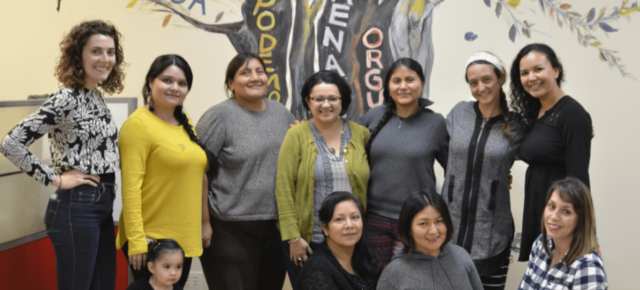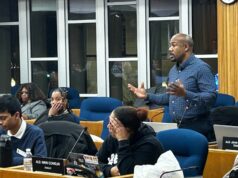Six women sought out to serve their community as Promotores de Salud (Community Health Workers) but ended up founding Roots4Change / Raíces Para El Cambio, the first cooperative of its kind led by Latina and indigenous women.
“All of them were interested in health. All of them were interested in making a difference in their lives first and the lives of their family and the lives in the community,” Mariela Quesada Centeno, the inaugural Centro Hispano Maternal and Child Health Community Based Fellow and Cooperative Developer, said.
Roots4Change / Raíces Para El Cambio, the first immigrant cooperative in Dane County, markets community-wide culturally aligned doula services, a postpartum peer support group, holistic wellness workshops, and events embracing cultural heritage & traditions. All six of the women who own the cooperative are first-time business owners and four of them offer services as certified doulas.
“Roots is the result of an idea almost four years ago,” said Quesada Centen.
Quesada Contento, the former Director of Adult Programs at Centro Hispano, said the organization mainly focused on providing programs for youth and adults but nothing in the middle for the whole family. This inspired them to explore ways to expand their reach within the community even though Centro Hispano has served over 5,000 members of the Dane County Latino population annually for more than 30 years
After consulting the community, the organization decided to include a family-centered wellness program to serve a as a bridge between youth programs and adult services. Centro Hispano wanted to create a space for families to enjoy one another, cook together and be themselves.
“Now, we needed someone to help run these activities because it wasn’t just going to be done with air,” Quesada Centeno said.
Centro Hispano looked to develop leadership from within the community to nurture the programs, even if staff leave the organization. Quesada Centeno said they looked at various models and settled on the “Promotora de Salud/Community Health Worker,” emphasizing the nutrition and wellness aspect of their family programming. In 2013, Centro Hispano began recruiting community members to participate in a training to become promotoras.
“We said since it’s related with nutrition and related with health, a good model is a community health worker model where people from the community can get some training and have to be health trainers, health advocates, and mobilizers, helping in the outreach and implementation of programs,” she said.
Training Community Health Workers / Promotores de salud
Initially, Centro Hispano recruited five women to participate in the training but later added another member. The organization solicited help from UW-Health, UW-Madison Department of Pediatrics, REAP, Harambee Village, Community Groundworks, UW-Extension, more than 50 professionals, academics and community members.
“So four years ago, all of this was happening and we started looking at who would be good person within the community, because being a promotora is not easy,” Quesada Centeno said.
After nearly a year, six women were presented with the idea of serving as community health workers. Unfortunately, the state of Wisconsin does not offer a certification, so Centro Hispano created an in-house training. The women would have to undergo hours of training in order to facilitate activities housed at Centro Hispano, a bulk of the training taking place between 2014-2015.
“At that point, we did not know how hard it was going to be,” Quesada Centeno said.
She said the women underwent extensive training, about five hundred hours worth, throughout an entire year. Physicians, nurses, pharmacists, social workers and health workers from other countries volunteered their time to speak to the women.
Quesada Centeno said the training included an array of different topics so the participants felt well-rounded. She said the women were able to understand health from a more comprehensive standpoint including learning coping and mindfulness strategies.
“The thing was the training was really holistic,” Quesada Centeno said.
This training focused on four areas; health, financial and computer literacy, leadership skills and mindfulness. Quesada Centeno said the women were incubated at Centro Hispano through a series of lectures, workshops and additional trainings paid for by the organization. The women took on a massive endeavor.
“While they were in classes, we had childcare. All the coordinating, everything happened within the purview of Centro staff,” she said.
Unfortunately, since a designation or certification for community health workers does not exist in the state of Wisconsin, the participants had no official validation of all the knowledge they acculumilated. This led the women to looking into becoming certified doulas.
“We already had this prior knowledge on health from the point of view of social determinants of health and social determinants of equity so we combined this with the doula training. It’s a really good match,” Quesada Centeno said.
This training occurred within the third year of this extensive training. The women also began implementing the health activities at Centro Hispano. The organization began paying them for their work.
The Origins of the Cooperative/ Raíces Para El Cambio
After facilitating activities and programs at Centro Hispano of Dane County, the newly certified doulas and promotoras searched for additional opportunities to receive an income for their services. This led to the idea of forming a marketing cooperative.
The cooperative was incorporated on November 14, 2018. Roots4Change / Raíces Para El Cambio would market and serve six businesses owned by the original participants of the community health worker training, some offering doula services and others facilitating workshops on trauma and health equity for Latinos throughout Dane County. By doing so, the women were able to share profits and risks while pooling resources for all six of their LLCs, all founded in the summer of 2018.
“Roots is an independent business. The women were incubated at Centro. Their training was incubated at Centro but Centro is not a business development agency,” Quesada Centeno said.
While Roots4Change / Raíces Para El Cambio is not housed within Centro Hispano of Dane County, some of the partnerships were born in conjunction with Centro, like a triad.
She said the seeds for Raíces grew organically. After all, the nature of a cooperative blended with the community health worker model. These women were already embracing the principles of a cooperative through their work.
“The idea of the co-op came to be because a co-op has a lot of the principles that we stand for: mutual education, taking care of the environment, leaving a legacy behind, cooperating with others. We were already doing that but we knew together that we would be stronger than seperate,” Quesada Centeno said.
Roots4Change/ Raíces Para El Cambio, owned by six independent social enterprises, is working to change the maternal and child health landscape to address inequities in perinatal well-being. Their cooperative vision includes allowing the diverse makeup of Latino families to participate in the co-creation of maternal and child well-being support they deserve.
“None of this would have happened without first, the persistence of the core team and the support and leadership of Centro Hispano,” Quesada Centeno said
Their initial training incubated at Centro offered specialized support to the women which helped them develop their skills as not just community health workers but entrepreneurs. Quesada Centeno said that in the process of training the participants were able to focus on developing areas of growth which is what made this particular program unique.
“I will never say this enough. That’s to be given credit to Centro Hispano to have supported me in terms of having this crazy idea to allow for the development of leadership. Now, we know that if Centro were to be gone tomorrow that these women will carry a legacy of leadership with them,” she said.
In the future, the cooperative plans to continue to provide a variety of services geared towards the Latino community including breastfeeding consultation, community workshops on addressing trauma, healthy eating and cooking classes, prenatal yoga and Community-Based Participatory Research.
“In addition, we are a member of Madison Cooperative Development Coalition, sit on the Public Health Breastfeeding Coalition, two LLCs are members of the Pregnancy Risk Assessment Monitoring System (PRAMS),” Quesada Centeno said.
Roots4Change / Raíces Para El Cambio will also consult on cultural humility and respect and maternal and child health in the Latinx community and is planning a Community maternal child health conference for the Fall.


































